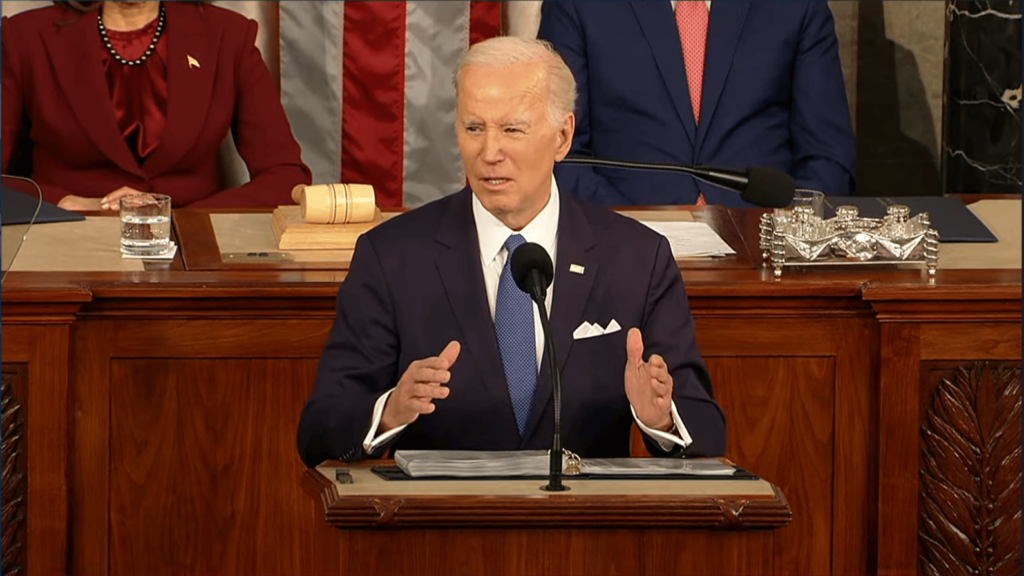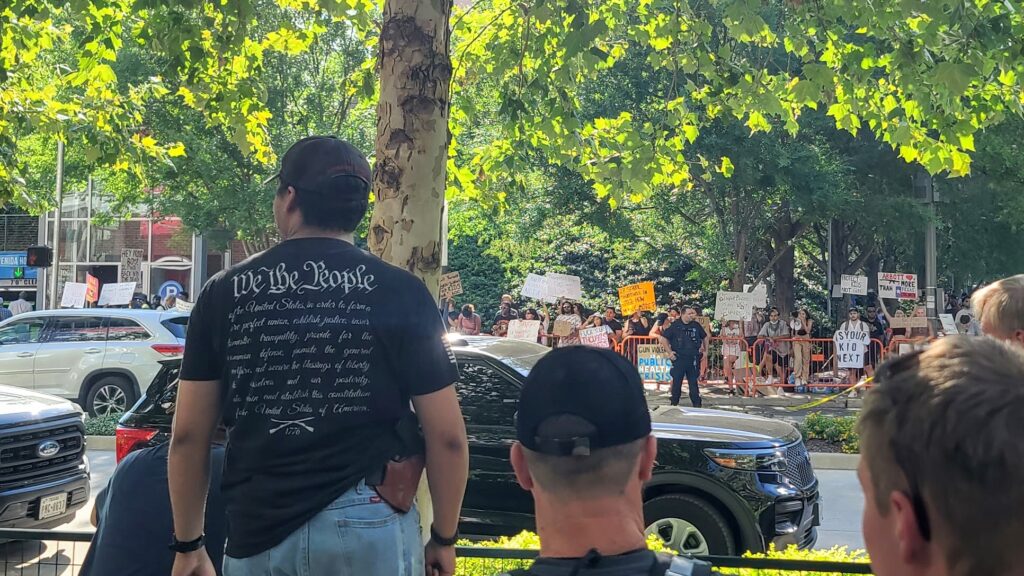The President’s losing streak has been extended. His gun agenda is being dismantled piece by piece by the federal courts.
His “ghost gun” ban is the latest one to be vacated. But, as I explain, it’s unlikely to be the last. In fact, its defeat only adds fuel to the fire that’s probably going to consume his pistol-brace ban soon too.
Political gridlock has effectively eliminated his ability to pass new gun legislation. And, now, his effort to do the same thing through executive action will probably be wholly repudiated before the end of the summer.
He may benefit from another trend, though. The murder rate appears to be dropping, perhaps at a record pace. Of course, while that may boost Biden’s political prospects, Contributing Writer Jake Fogleman explains why it might also diminish support for new gun restrictions.
Plus, author and lawyer Mark W. Smith explains the Supreme Court’s new Second Amendment case on the podcast.

Analysis: Biden’s Gun Agenda Battered Again in Court [Member Exclusive]
By Stephen Gutowski
The President has hit another setback in court, and it’s only going to get worse for him from here.
Just over a week ago, Judge Federal District Court Judge Reed O’Connor vacated the ATF rule that redefined what constitutes a firearm in an effort from Joe Biden to bring homemade guns under the agency’s purview. He found the rule expanded the agency’s power beyond its constitutional bounds and contradicted the statutory language it was interpreting.
“This case presents the question of whether the federal government may lawfully regulate partially manufactured firearm components, related firearm products, and other tools and materials in keeping with the Gun Control Act of 1968,” Judge O’Connor wrote in Vanderstok v. Garland. “Because the Court concludes that the government cannot regulate those items without violating federal law, the Court holds that the government’s recently enacted Final Rule… is unlawful agency action taken in excess of the ATF’s statutory jurisdiction. On this basis, the Court vacates the Final Rule.”
The “ghost gun” ban is just the latest domino to fall in the legal fight against Biden’s executive actions. The first was the bump stock ban. Implemented by President Donald Trump but defended by the Biden Administration, the successful case against it in the Fifth Circuit laid the groundwork for the fight against the other ATF rules that came after.
Interestingly, that case is not based on Second Amendment claims. Even though the Supreme Court handed down a landmark gun case in last year’s New York State Rifle and Pistol Association v. Bruen, the High Court’s new history and tradition test is nowhere to be seen in Judge O’Connor’s ruling or the rulings against the bump stock ban.
Instead, the arguments against the bans have relied on the Administrative Procedures Act and the rule of lenity. A much less attention-grabbing fight to be sure. But one that has been highly successful for gun-rights advocates to this point.
The ATF rules have all involved the agency going back on previous determinations it had made in order to expand its authority to regulate different devices and parts. And they’ve all involved highly controversial interpretations of the statutes the agency claims its power is derived from. Since that combination exists in all the rules, they are all equally vulnerable to the same legal attack.
That attack centers around the claim that the ATF doesn’t have the authority to try and ban the devices in question as well as the idea that their interpretation of federal gun laws was both faulty and contradicts their earlier interpretations. That has been a winning argument so far.
“As an initial matter, it purports to allow ATF—rather than Congress—to set forth the scope of criminal prohibitions,” Judge Jennifer Walker Elrod wrote for the majority in the Fifth Circuit’s Cargill v. Garland. “Indeed, the Government would outlaw bump stocks by administrative fiat even though the very same agency routinely interpreted the ban on machineguns as not applying to the type of bump stocks at issue here. Nor can we say that the statutory definition unambiguously supports the Government’s interpretation.”
The argument is likely to continue its winning streak in the very near future as another Fifth Circuit court is set to decide what to do with President Biden’s pistol-brace ban. Oral arguments were just held in Mock v. Garland. There’s a better-than-good chance that case will also come down in favor of the plaintiffs.
After all, the panel in Mock has already issued an injunction blocking the ATF from enforcing its rule while the case moves forward. It wasn’t a nationwide injunction, but it was nearly as broad and covered members of the gun-rights group involved in the case. That injunction spawned three more from lower court judges in the circuit along the same lines.
When a court issues a preliminary injunction against a law, it only does so because it believes the plaintiffs will win on the merits. It’s possible the Biden Administration came up with new information or a brilliant argument during the trial on the merits, but it’s far more likely a decision tossing the pistol-brace ban will be handed down soon.
President Biden has lost every case against attempts to unilaterally expand the ATF’s power and institute gun control measures. Before the summer is over, all of the President’s executive actions on guns will likely be tossed.
Come on the Podcast
One of the many perks of a Reload membership is the opportunity to appear on the podcast. We’ve had a lot of people on the show from all kinds of backgrounds. It’s one of my favorite segments since it gives us all a better insight into the community that makes this publication possible. If you want to come on the show, just reply to this email and let me know!
Podcast: Author Mark W. Smith Explains the New Supreme Court Gun Case [Member Early Access]
By Stephen Gutowski
The Supreme Court just agreed to take up a brand new Second Amendment case. So, we’ve got author and member of the Supreme Court bar Mark W. Smith on the show this week.
Smith, who also hosts the Four Boxes Diner YouTube channel, joins to talk about the ins and outs of United States v. Rahimi. The Supreme Court will have to decide whether the Second Amendment protects the right of those subject to a domestic violence restraining order to own guns. And, as Smith notes, it will be doing so for one of the least sympathetic defendants imaginable because Rahimi is the suspect in a long list of violent crimes.
That means the Court could rule to uphold the restriction, according to Smith. And that’s why, he argues, the case was appealed straight up to the Supreme Court by Attorney General Merrick Garland even though there was another level of appeal he could have gone to first.
Still, Smith isn’t convinced the case is that cut and dry. He argued the Court may well find the lower bar of evidence required to issue a restraining order compared to obtaining a criminal conviction could cause enough justices to turn against the restriction. And he said the Court has shown it is not as sensitive to public criticism as in previous years.
He said the decision to take this case to SCOTUS may backfire on Garland, but also admitted it’s not clear where the Court will come down.
Plus, Contributing Writer Jake Fogleman and I talk about President Biden’s “ghost gun” ban being vacated. And I discuss my continued frustrations with trying to renew my concealed carry permit.
You can listen to the show on your favorite podcasting app or by clicking here. Video of the episode is available on our YouTube channel. Reload Members get early access on Sunday, as always. It will be available for everyone else on Monday.

Analysis: The Murder Rate Appears to Be Dropping. How Will That Impact Gun Politics? [Member Exclusive]
By Jake Fogleman
After a multi-year spike following the onset of the COVID pandemic, the U.S. homicide rate looks to be falling. If that continues, it could usher in a reshuffling of the country’s current gun politics.
The murder rate is down roughly 11 percent in 100 major U.S. cities through the first half of the year, according to crime analyst Jeff Asher. Though the overall murder rate is still about 12 percent above pre-pandemic levels, according to the AH Datalytics dashboard, the numbers are on track to land about 10 percent lower than last year.
That drop would “be among the largest declines in murder ever formally recorded,” according to Asher.
He found that the U.S. homicide rate declined slightly in 2022 from 2021 levels as well, though not to the same degree as in the first half of 2023. That means that the decline in murder has been more sustained than just a simple six-month window of good fortune. If Asher’s analysis is anything close to accurate, and the reduction in homicide continues to be as substantial as it appears, the American people will eventually take notice.
As it stands now, they don’t seem to know quite yet. A series of recent polls have identified violent crime and gun violence as a significant focus for voters, so much so that the public has even begun to sour on the need to defend gun rights.
A May NPR/PBS NewsHour/Marist poll found the highest number of Americans in over a decade who say the need to defend gun rights is less important than reducing gun violence. It found 60 percent of Americans now think controlling gun violence is more important, including 55 percent of self-described political independents, while just 38 percent say the opposite. That’s up significantly from a decade ago when the public was evenly split on the question.
Additionally, a June poll from Pew Research found 60 percent of Americans now say violent crime and gun violence are “a very big problem.” The number of respondents who rated gun violence as a “very big problem” increased 12 percent since 2016 and was up nine percent since May of last year.
That same poll found that 58 percent of Americans want gun laws to be stricter, up five points from 2021. There was also an 11-point increase since 2018 in the number of Americans who say overall gun ownership does more to “reduce safety by giving too many people access to firearms and increasing the chances for misuse.”
In other words, as broader concerns over gun violence and violent crime began to increase alongside real-world increases in homicide, so too did support for gun control and negative feelings toward guns. As the reverse starts to happen with homicides, support for gun rights may begin to rise again.
However, some important caveats could complicate that. While murder appears to be declining, mass shootings do not appear to be abating. According to the Gun Violence Archive, which takes an expansive definition covering any incident in which four or more people are shot, the U.S. is currently on a record pace for mass shootings in 2023.
Even under a more traditional definition like the one used by the Violence Project—which tracks events where four or more people are killed in public shootings, except those attributable to underlying criminal activity, such as robberies or gang fights—2023 is shaping up to be a particularly grim year. The site tracked seven such incidents in all of 2022, while there have already been five recorded this year.
Though such events only represent a small fraction of the country’s homicides every year, they tend to disproportionately capture the psyche of the American public, shape political narratives around guns, and have the largest impact on public opinion over gun control. That means that whatever boost gun-rights supporters might otherwise receive from an overall decline in homicide could ultimately hinge on the frequency of mass shootings moving forward.
Ultimately, it remains to be seen what happens over the next six months. If current trends hold and there is a substantial reduction in homicides, historical polling dynamics would suggest that could be a boon for political support for gun rights. But the ongoing scourge of mass shootings could thwart any potential polling boost unless those also start to decline.
That’s it for now.
I’ll talk to you all again soon.
Thanks,
Stephen Gutowski
Founder
The Reload







